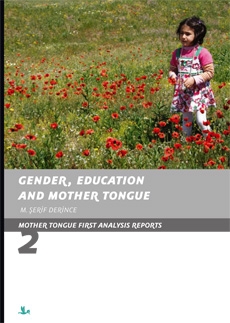| Éditeur : DİSA | Date & Lieu : 2012, İstanbul |
| Préface : | Pages : 44 |
| Traduction : | ISBN : 978-605-5458-09-6 |
| Langue : Anglais | Format : 205x280mm |
| Code FIKP : Liv. En. | Thème : Général |
|
Présentation
|
Table des Matières | Introduction | Identité | ||
 Versions:
Gender, education and mother tongue Disa
M. Şerif Derince teaches Kurdish at Sabanci University and Boğaziçi University and continues his PHD in sociology at Mimar Sinan University. He is one of the three authors of the scar of tongue report published by DISA and wrote the field work section of the book. He is also coordinating the “raising awareness on mother tongue and bilingualism in education” which this paper is a part of. Within the scope of “raising awareness on mother tongue and bilingualism in education” he has organized the preparation of six bilingual leaflets in Kurdish and Turkish and has writ ten a report on Multilingual education models entitled “mother tongue based Multilingual and multi-dialectal dynamic education,” Suggesting possible mother-tongue based education models to be used in the education of Kurdish students in turkey with different characteristics and needs. Completing his undergraduate and graduate studies in the language education department of Boğaziçi University, Derince has writ ten papers on issues related to Kurdish language, mother tongue, education and literacy for various journals and newspapers. | |||||
|
Introduction Girls and women whose mother tongue is different from the medium of instruction are subject to more severe discrimination. In a report entitled “Girls, Educational Equity and Mother Tongue-Based Teaching” prepared for UNESCO, Carol Benson states that language, and especially the language used for educational instruction, constitutes one of the main mechanisms in the continuous reproduction of inequality. According to this report, in communities that are subject to the type of inequality where language is a factor in reproducing inequalities, girls and women whose mother tongue is different from the medium of instruction are subject to more severe discrimination.1 Similarly, Stromquist says that even in regions where a relative degree of gender equality is achieved in education, a significant amount of inequality exists from the point of view of different ethnic groups and the poor who live in these regions.2 As indicated by this research, in many parts of the world people in the lowest socioeconomic strata generally belong to minority ethnic groups and their mother tongue language that is different from the dominant language spoken in that region or country. Moreover, the ethnic groups that these people are members of are generally unable to benefit equally from the social, political, medical and educational opportunities provided by the state, which is founded on the dominant community’s criteria. Although many different methods of exclusion exist, one of the most prominent strategies used to marginalize groups is to institute policies banning the use of the communities’ mother tongues. Since the social, political and economic environment does not permit multilingualism and since the language of the environment is dominated by the language of the dominant group, many people who do not speak the dominant language are unable to make their presence felt in such environments. Even in cases where people do speak the language of the dominant group, they generally speak it with a different accent and may still therefore be subject to discrimination and exclusion. For a variety of reasons, in terms of using the dominant language in their social, political and economic lives, women have even less opportunities than men.3 The observations and experiences recounted by teachers who participated in the teacher workshops organized by the Diyarbakır Institute for Political and Social Research (DISA) organized in 2011 indicated that the effect of official language policies on Kurdish students varies according to students’ gender. The first of these workshops took place on May 7, 2011 in Diyarbakır, with the participation of Kurdish teachers working in Diyarbakır, as well as teachers working in cities such as Şırnak, Bingöl, Hakkari, Van, Urfa and Batman; the second was realized from July 4-5, 2011, again in Diyarbakır but this time with the participation of teachers working in parts of cities like Ankara, Istanbul, Mersin and Izmir where Kurds have immigrated for various political and economic reasons. The issues covered in these workshops consisted of the linguistic, psychological, political and social factors that determine the scholastic and educational experiences of Kurdish students. The schooling ... | ||||